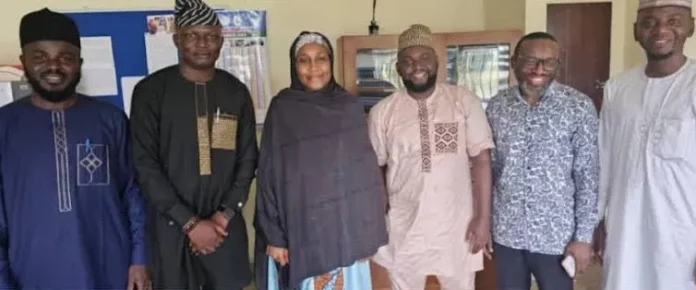After 10 grueling months in captivity, Kaduna-based doctor, Ganiyat Popoola, has finally regained her freedom.
The medical community and her family are breathing a sigh of relief after what was a terrifying experience.
Dr. Popoola, a respected registrar in the Department of Ophthalmology at the National Eye Centre in Kaduna, was abducted in December 2023.
The incident shook her colleagues, family, and the entire medical community in Nigeria.
The abduction took place under frightening circumstances, with her husband, Nurdeen Popoola, and nephew, Folaranmi Abdul-Mugniy, also being taken captive.
While Mr. Popoola was released earlier after a reported ransom was paid, Dr. Popoola and her young nephew remained in the clutches of their kidnappers.
Family members and the Nigerian Association of Resident Doctors (NARD) had been advocating tirelessly for their safe return.
Finally, on October 30, 2024, Dr. Popoola’s nightmare ended, and she was able to reunite with her family.
The president of NARD, Dr. Tope Osundara, confirmed the joyous news of her release in a telephone interview, assuring the public that no ransom was paid for her freedom.
A statement released by NARD’s Public Relations Officer, Omoha Amobi, expressed relief and gratitude for her return.
“The president of NARD, Osundara Tope Zenith, is filled with immense joy and relief to inform you that Ganiyat Popoola, our dear colleague and resident doctor from National Eye Centre Kaduna, who was kidnapped and remained in captivity for more than ten months, has been released and reunited with her family,” the statement read.
The medical association expressed profound gratitude to everyone who supported Dr. Popoola’s return, emphasizing the importance of solidarity and community in these challenging times.
The abduction of Dr. Popoola brought to light the increasing risk that health workers in Nigeria face in the midst of rising insecurity.
In recent years, kidnappings have become a dangerous trend, affecting not only civilians but also professionals, including doctors.
For health workers, who dedicate their lives to saving others, the threat of being abducted is both heartbreaking and terrifying.
In August, NARD organized a seven-day warning strike to protest Dr. Popoola’s abduction, demanding action from the government.
Doctors across the country joined the protest, calling on the government to enhance security and ensure the safe release of their colleague.
The strike sent a powerful message, showing the government and the public that the medical community would not remain silent in the face of such injustice.
Doctors from Lagos to Abuja marched in unison, making their voices heard.
The protests were held in major hospitals, including the Lagos State University Teaching Hospital (LASUTH), the National Hospital in Abuja, and the Olabisi Onabanjo University Teaching Hospital in Sagamu, among others.
The nationwide demonstration showed the unity of Nigeria’s medical professionals and the strength of their call for justice.
The protest was not only about Dr. Popoola’s freedom but also about the growing insecurity that health workers face every day.
For many doctors, the abduction of one of their own is a reminder of the risks they take, simply by doing their jobs.
In Nigeria, violence against health workers is on the rise.
According to the Safeguarding Health in Conflict Coalition (SHCC), there were 19 reported incidents of violence against health workers in 2023 alone.
The dangers include not only kidnappings but also threats, harassment, and sometimes even deadly attacks.
The insecurity has left health workers and their families in constant fear, affecting their ability to provide essential services to communities in need.
Many medical professionals are now reconsidering their careers in areas known for high crime rates.
Some are relocating to other regions or even leaving the country entirely to find safer environments where they can work without the fear of being abducted.
Dr. Popoola’s ordeal has highlighted these concerns and underscored the need for immediate action.
The release of Dr. Popoola has brought relief, but the scars of her experience will take time to heal.
While her family celebrates her return, there is an underlying fear that such incidents may happen again if action is not taken.
The Nigerian government has promised to address these security challenges, but progress has been slow.
For many, the release of Dr. Popoola is bittersweet—a victory for her family and friends but a stark reminder of the reality of life in parts of Nigeria.
Doctors and health workers have appealed to the government to prioritize the safety of professionals working in vulnerable areas.
Medical professionals are essential to the nation’s well-being, and their safety is crucial to the country’s health.
NARD is urging the government to implement stronger security measures, especially in regions like Kaduna, where armed groups have become a persistent threat.
Dr. Popoola’s freedom is a reminder of the power of unity and the importance of community support in challenging times.
The medical community, her family, and the public rallied together, proving that collective action can make a difference.
The Association of Resident Doctors has vowed to continue advocating for a safer environment for health workers across the country.
“We will not rest until every doctor can work without fear,” NARD’s president stated passionately.

